News
Newsletters
Events
- July 2025 - Harmonist Dany Mestas attends the 16th Fraunhofer International SummerSchool on Radar/SAR
- June 2025 - Third HARMONY network-wide event
- November 2024 - Harmonists at the ESA Antenna Workshop 2024
- October 2024 - Harmonist Alessandro Mastropietro co-authors for ESA Concurrent Enginnering Workshop 2023 Paper presented at IAC 2024
- September 2024 - Visit of Prof. George Goussetis at the University of the Bundeswehr Munich
- July 2024 - Harmonist Alessandro Mastropietro partecipates in Alpach Summer School 2024
- July 2024 - Our doctoral candidate Dany Mestas participates in the 3rd ESA Earth Observation Remote Sensing Workshop
- June 2024 - Second HARMONY Network-wide Event
- May 2024 - Harmonist Alessandro Mastropietro presents his research at MBSE Workshop 2024 in Bremen
- May 2024 - Harmonist Alessandro Mastropietro wins MBSE Workshop 2024 Hackathon
- May 2024 - Harmonist Alessandro Mastropietro Presents His Research With International Aerospace Engineering Phd Students at AIDAA PhD Days 2024
- April 2024 - Harmonist Aymeric Cailleux participates to the Thales UK PhD days 2024 in Glasgow
- March 2024 - Convened session on satellite communications at EuCAP'24 in Glasgow, UK
- January 2024 - “Satellites are Becoming the New Cellphone Towers”: Interview of HARMONY supervisors Prof. Andreas Knopp and Dr. Thomas Delamotte in IEEE Spectrum flagship magazine
- December 2023 - Harmonist Oscar Martinez work on Distributed Feeder Links for NGSO Multi-constellations has been awarded third place in the 6G and NTN : Challenges and Solutions Contest!
- November 2023 - Harmonists Giulio Orlando and Aymeric Cailleux attend the Satellite Communication Systems Training Course at the ESA Education Training and Learning Facility
- October 2023 - Ph.D candidate Oscar Martinez attends the 40th ICSSC colloquium and the SatNEx 2023 doctorate school
- September 2023 - Our doctoral candidate Alessandro Mastropietro attends the ESA Concurrent Engineering Workshop 2023
- September 2023 - Keynote speech from Prof. Andreas Knopp at PIMRC 2023
- May 2023 - First Harmony Newtork-wide Event
- March 2023 - Harmony at the EUCAP Conference
- October 2022 - Kick-off Meeting
The Harmony team is thrilled to share that our Harmonist Dany Mestas has just completed the 16th International Fraunhofer Summer School on Radar/SAR in Bonn.
📚 For one intensive week, Dany joined 40+ young scientists to dive deep into:
🔸 Radar fundamentals & SAR interferometry
🔸 Waveform design, MIMO techniques & AI-powered cognitive radar
🔸 Active antennas, hardware labs, and additive manufacturing demos
🔸Polarimetry, remote sensing, and space-situational-awareness (including an exclusive tour of the legendary TIRA radar!)
On behalf of the Harmony project, huge thanks to the Fraunhofer FHR team for the inspiring programme and the vibrant knowledge exchange across the radar and space communities.

🇪🇸 🇫🇷 In addition to these exceptional training opportunities, Dany is further conducting his research on low-complexity distributed processing for distributed satellite systems in collaboration with Thales Alenia Space, Spain and France.
By bridging academic research with industrial application, this experience will provide critical insights into the challenges and solutions involved in real-world onboard signal processing.
📚 For one intensive week, Dany joined 40+ young scientists to dive deep into:
🔸 Radar fundamentals & SAR interferometry
🔸 Waveform design, MIMO techniques & AI-powered cognitive radar
🔸 Active antennas, hardware labs, and additive manufacturing demos
🔸Polarimetry, remote sensing, and space-situational-awareness (including an exclusive tour of the legendary TIRA radar!)
On behalf of the Harmony project, huge thanks to the Fraunhofer FHR team for the inspiring programme and the vibrant knowledge exchange across the radar and space communities.

🇪🇸 🇫🇷 In addition to these exceptional training opportunities, Dany is further conducting his research on low-complexity distributed processing for distributed satellite systems in collaboration with Thales Alenia Space, Spain and France.
By bridging academic research with industrial application, this experience will provide critical insights into the challenges and solutions involved in real-world onboard signal processing.

The third HARMONY network-wide event took place from June 2nd to June 6th, 2025, at the University of the Bundeswehr Munich (UniBw).
Following the two previous gatherings held in Toulouse (2023) and Rennes (2024), France, this event once again served as an excellent opportunity for HARMONY doctoral candidates and their supervisors to exchange insights on their research activities and strengthen synergies between the individual projects. As most HARMONY doctoral candidates are now entering the final year of their doctoral journey, the event fostered thorough and highly productive discussions on the final steps of their research. These conversations aimed to maximize the value of the HARMONY outcomes and ensure that future research and development efforts can build upon these results. In addition to these internal exchanges among project partners, the HARMONY candidates presented their research during a dedicated one-day workshop open to UniBw researchers, allowing for further enriching dialogue. The workshop program was complemented by presentations from UniBw researchers and invited guests from the GLITTER project—another Horizon Europe doctoral network coordinated by Prof. Christophe Craeye from the Catholic University of Louvain.
Throughout the week, several keynote speakers also enriched the program with insightful talks. Prof. Schilling from the Center of Telematics in Würzburg opened the event with his presentation “New Space Approaches to S5: Smart, Small, Self-organizing Satellite Systems,” offering a deep dive into multi-satellite missions his institute is or has been involved in. His research interests closely align with HARMONY’s focus, making his contribution particularly valuable for participants exploring robust and cost-efficient distributed satellite systems. Another highlight was Prof. Roger Förstner from the Institute of Space Technology and Space Applications at UniBw. In his talk “Ready for Review!? The Path to a Successful PDR,” he shared practical advice on achieving Preliminary Design Review (PDR) readiness for New Space missions. The program also included an entrepreneurial perspective, with Stephanie Wißmann—co-founder and managing director of the start-up Secublox—delivering the presentation “Entrepreneurship in Space-Tech and Defence – Why You Should Think About Starting Up.”

Training during the event extended beyond presentations, notably through a hands-on activity focused on designing a satellite mission for direct-to-device connectivity up to preliminary design review (PDR) maturity. This so-called Space Mission Analysis and Design (SMAD) activity is a central component of HARMONY’s training approach. It promotes interdisciplinary collaboration and teamwork—crucial skills for future engineers working on complex satellite missions. The outcomes of this activity will be documented in a public deliverable of the HARMONY project.
Overall, the HARMONY network-wide event proved to be an extremely productive week for all participants. The event concluded with a visit to the production facilities of LSS GmbH, a HARMONY beneficiary and manufacturer of deployable reflector antennas. Many thanks to Dr. Leri Datashvili, CEO & Chief Designer of the company, for the engaging guided tour on the design of deployable reflector antennas!

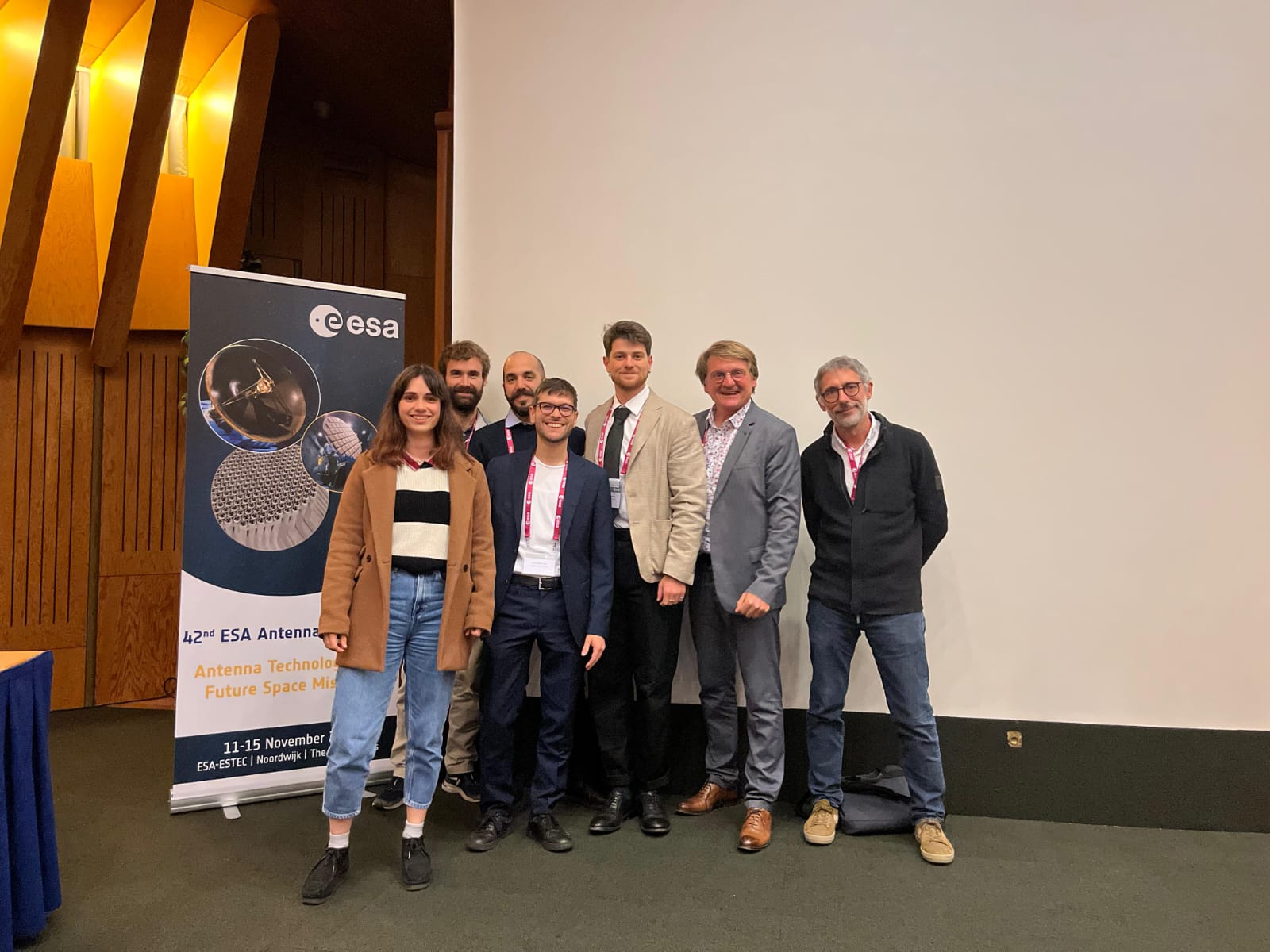
HARMONY is delighted to announce that three of its PhD students had the opportunity to present their work at the 42nd ESA Antenna Workshop, held at @ESA, ESTEC in Noordwijk, the Netherlands. @Alex_Evrard, @Aymeric_Cailleux, and @Giulio_Orlando showcased their research on the following topics:
• Alex Evrard: "Dynamic Analysis and Optimization of Intersatellite Links Antennas Specifications for Federated and Fractionated Satellite Systems."
• Aymeric Cailleux: "Modelling of a Multiple Beams Transmitter Experiencing Antenna Crosstalk and Load-Pull Effect."
• Giulio Orlando: "Optimizing communication capabilities in Non-Terrestrial Network: A comparative analysis of continuous and Distributed Aperture Solutions."
We extend our gratitude to the workshop organizers and participants for their warm welcome, insightful questions, and valuable feedback. We look forward to building new collaborations inspired by these fruitful discussions.
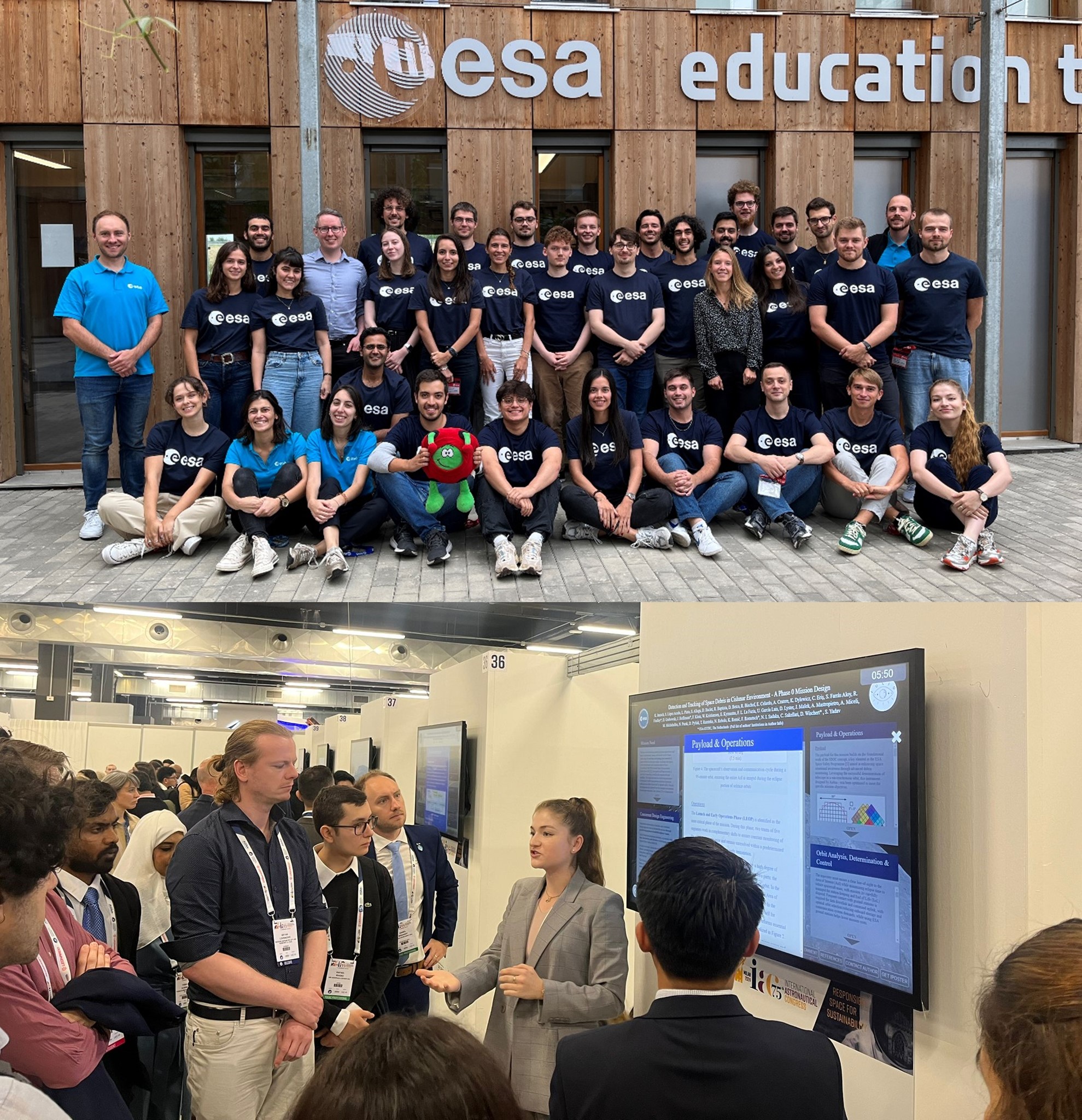
In October 2024, Alessandro Mastropietro co-authored a paper presented at the International Astronautical Congress (IAC) 2024 in Milan, following his participation in the ESA Concurrent Engineering Workshop 2023. During the workshop, Alessandro and 40 other students worked with ESA engineers to design the space and ground segments of a mission using the COncurrent Model-based dEsign Tool (COMET). The event, held at the ESA Academy's Concurrent Design Facility (CDF), demonstrated how model-based and concurrent engineering approaches can optimize design performance, improve decision-making, and enhance risk management.
This experience was pivotal for Alessandro’s research, providing valuable insights into Concurrent Engineering and fostering connections with peers and experts across Europe. The paper, resulting from the team's collective efforts, was presented at IAC 2024, marking an important milestone in promoting Concurrent Engineering methodologies in space systems design.
#IAC2024 #ESA #ConcurrentEngineering #ModelBasedDesign #COMET #SpaceResearch #HARMONYProject #SpaceSystems
Event Website
Link to the Paper (Coming soon)
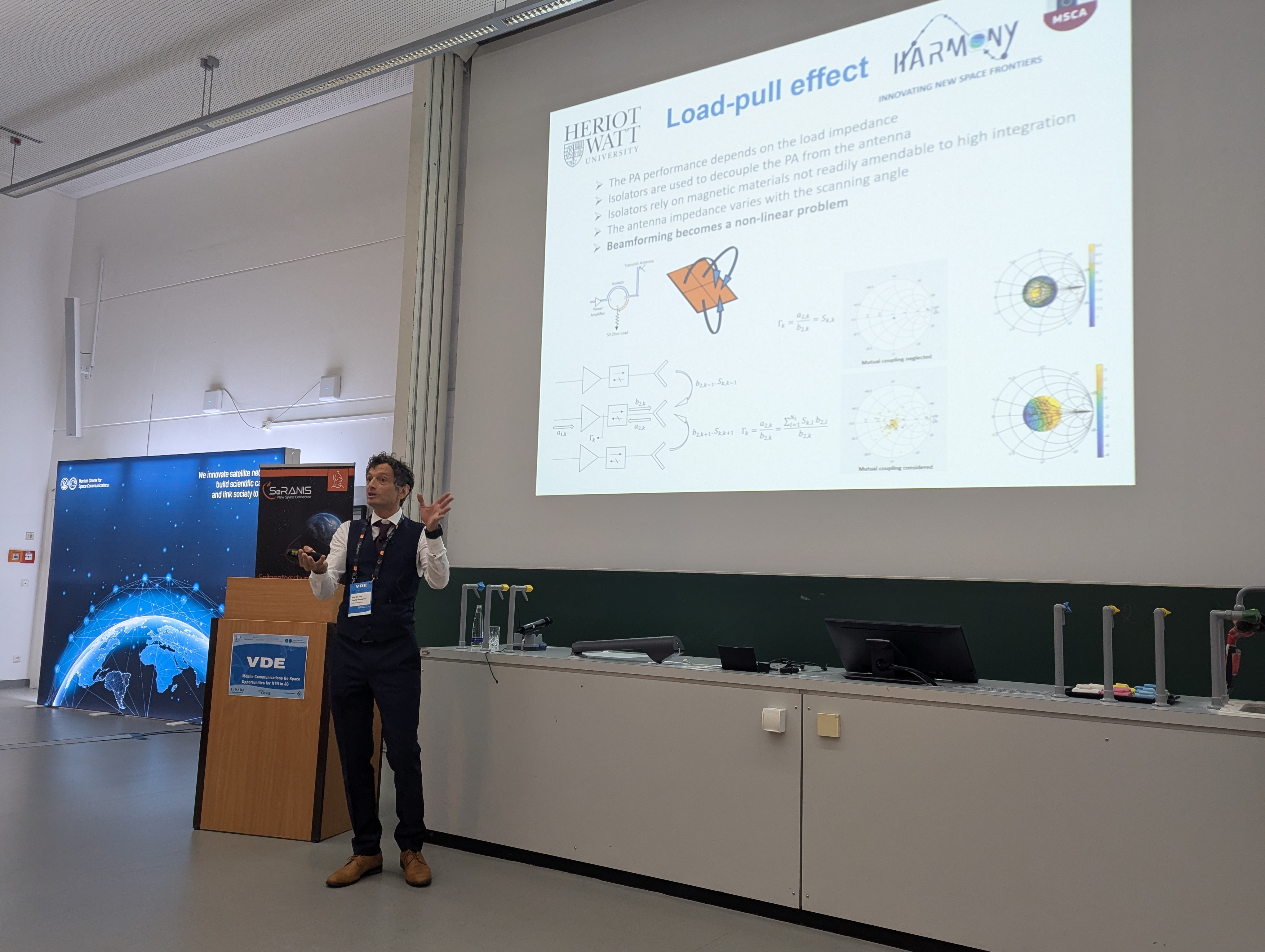
Prof. Goussetis George, head of the Institute of Sensors, Signals & Systems at Heriot-Watt University and supervisor of the HARMONY project, visited the Munich Center for Space Communications (MCSC) from Prof. Andreas Knopp at the University of the Bundeswehr Munich on the 11th and 12th of September 2024.
On the first day, Prof. Goussetis familiarized himself with the host university’s projects and laboratory facilities focusing on satellite systems design. Engaging discussions covered a range of topics, including direct-to-cell connectivity, opportunistic LEO PNT (Low Earth Orbit Positioning, Navigation, and Timing) and MIMO (Multiple Input Multiple Output) solutions for satellite communications. Additionally, he delivered an invited one-hour talk to the MCSC research team, where he presented recent advancements from his team at Heriot-Watt University, particularly on active satellite antenna solutions aimed at optimizing radio resource management.
On the second day, Prof. Goussetis participated in the VDE scientific conference, “Mobile Communications Go Space – Opportunities for NTN in 6G,” which was hosted by MCSC and featured talks on the latest technological innovations in space networks. During his presentation in front of more than 70 experts from the German academic and industrial community, he shared insights on cutting-edge antenna technologies and highlighted key activities of the HARMONY project in this field.
The visit not only facilitated productive in-person discussions but also strengthened the ongoing research collaboration between Heriot-Watt University and the University of the Bundeswehr, paving the way for future joint projects.
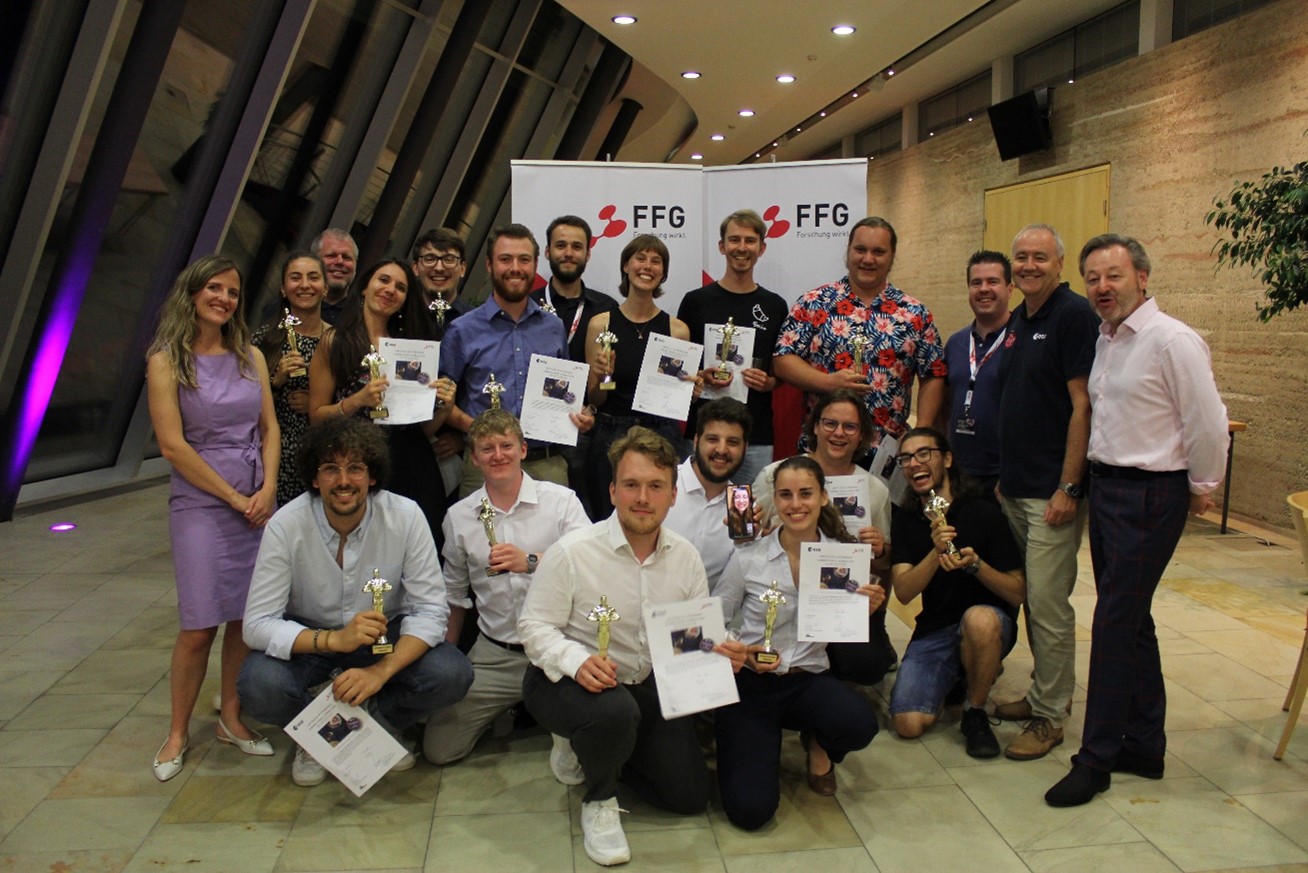
HARMONY’s Alessandro Mastropietro participated in the prestigious Alpbach Summer School 2024, organized by FFG, ESA, and Austrospace. This renowned event brought together 60 students from ESA member states to design space missions under the theme “Giant Planets and their Moons.”
Alessandro took on the key roles of Project Manager and Mission-Level System Engineer, leading his team in developing the SIREN (Saturn Atmosphere Investigation of Rings and Enceladus) mission, accompanied by the probe ARGO (Atmospheric Research and Gas Composition Observer). Their proposal stood out for its technical depth and innovation, earning the team the Best Technical Case Award.
The summer school showcased how diverse backgrounds fuel collaboration and innovation, highlighting the power of international teamwork over conflicts. Sharing ideas and learning alongside future European leaders in science and exploration created an inspiring environment, filled with passion and expertise.
We extend our gratitude to the organizers for making this extraordinary event possible.
#SummerSchoolAlpbach #SpaceExploration #Saturn #MissionDesign #Innovation #Teamwork #ESA #FFG #Austrospace #HARMONYProject
Summerschool Website
Link to the Report
Link to the Presentation

Dany Mestas recently participated in the 3rd edition of the Earth Observation Remote Sensing Workshop organized by the European Space Agency at ESEC, Belgium. Over the span of five days, he had the opportunity to meet a dynamic group of students from different backgrounds, all enthusiastic about Earth observation. This enriching experience enabled him to consolidate his knowledge of the various applications of remote sensing, including optics, infrared, and radar, and put new tools into practice through concrete examples.
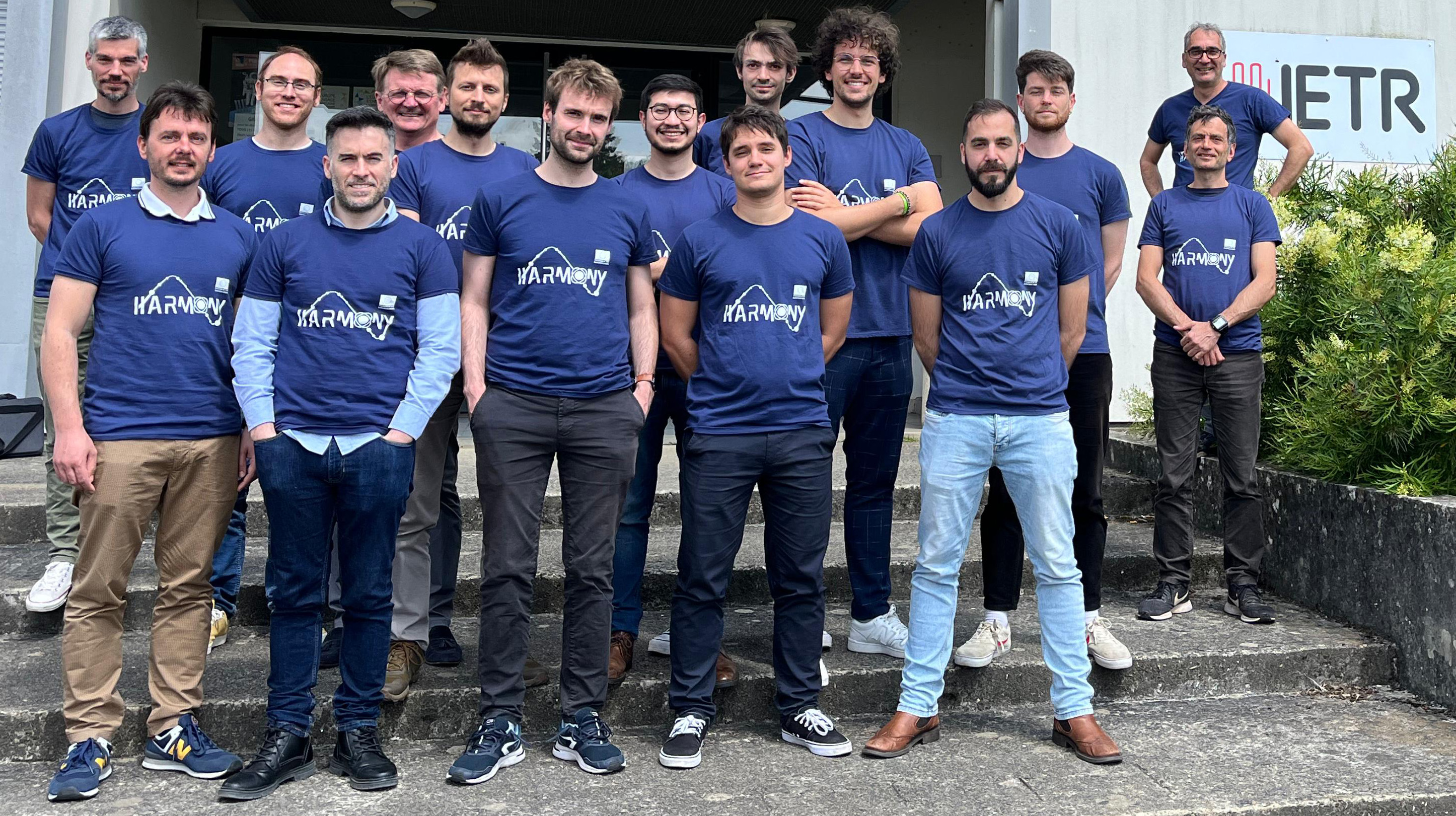
The second HARMONY network-wide event was held from June 3rd to June 7th, 2024, at the CNRS research laboratory IETR in Rennes, France.
During this intensive week, the HARMONY doctoral candidates participated in training activities focused on the analysis and design of space missions, as well as on eco-design and life cycle assessment of space systems. These activities were organized to best prepare our students for their future careers as research and development engineers. Faster design phases, particularly fostered by innovative concurrent engineering and model-based system engineering methodologies, and the growing importance of environmental considerations will deeply impact the space industry. In this context, HARMONY ensures that tomorrow’s engineering leaders will have the skillsets required to address upcoming challenges.
On June 5th, 2024, a joint scientific workshop with IETR and a hybrid keynote session with the doctoral network ANTERRA also took place. The HARMONY candidates had the opportunity to present the HARMONY project and the results of their first year of research to a broader scientific audience, including researchers and master’s students from IETR. The participants were able to network with peers and engage in stimulating scientific exchanges. Christophe Craeye, a professor at the University of Louvain (Belgium) and coordinator of the Horizon Europe project GLITTER, joined the event online for a short presentation of his new doctoral network on synchronized constellations of CubeSats for GNSS-R applications. Possible collaborations between the HARMONY and GLITTER doctoral networks will be explored in the near future.
Overall, the HARMONY event week was a great success. The various training activities and discussions between supervisors and doctoral candidates further strengthened the synergies between the different HARMONY PhD projects. The first research and training objectives have been reached, and the outcomes of the network-wide event will greatly influence the activities of the doctoral network in the coming months. Thank you to IETR, and in particular to Christophe Moy, Jordane Lorandel, and Ronan Sauleau, for hosting the event and for the tour of the IETR research facilities that concluded this excellent week.
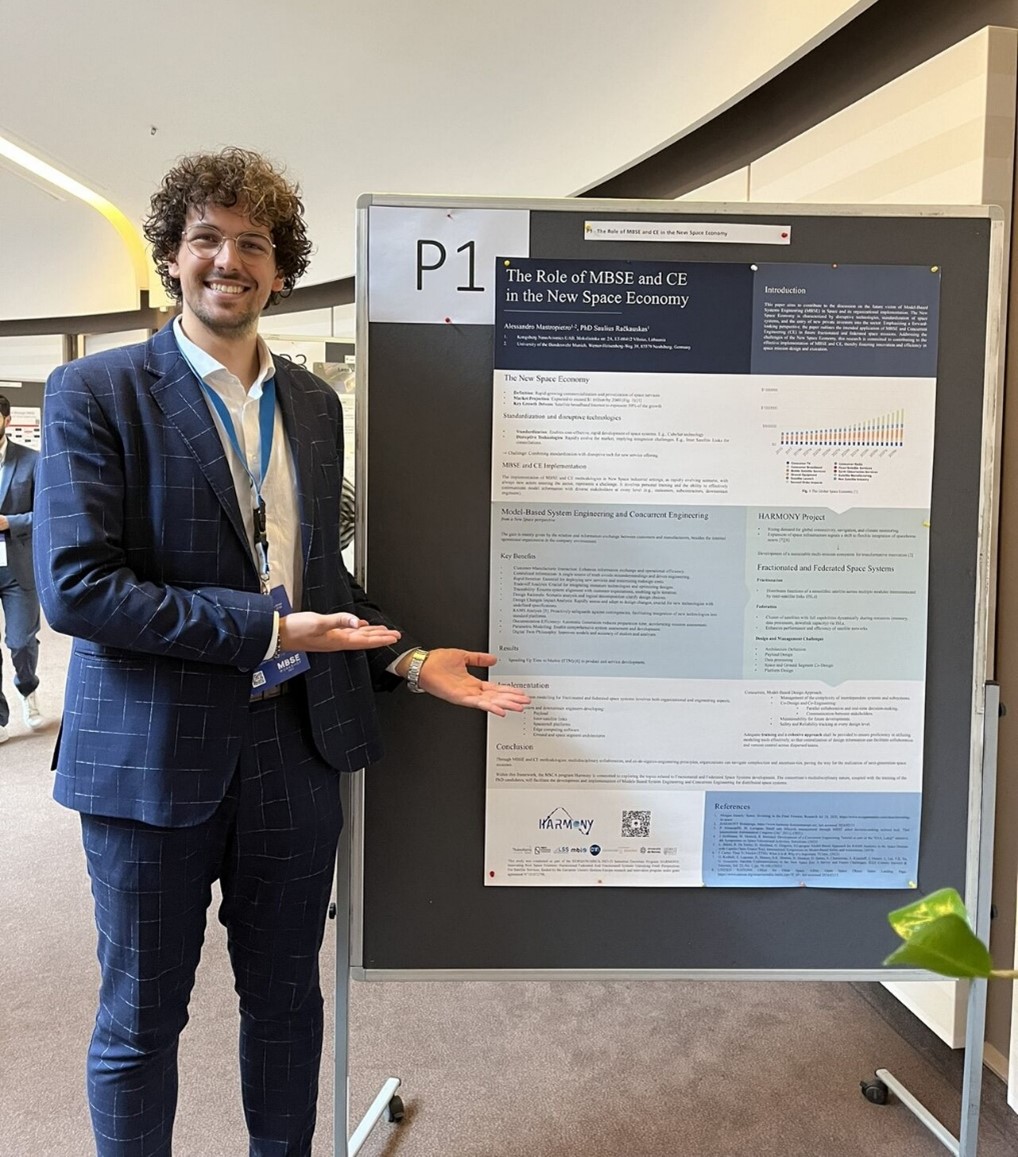
HARMONIST Alessandro Mastropietro presented his paper, "The Role of MBSE and CE in the New Space Economy," at the MBSE Workshop 2024. This paper contributes to the ongoing discussion on the future vision of Model-Based Systems Engineering (MBSE) in space and its organizational implementation. Focusing on the New Space Economy, Alessandro’s research highlights how disruptive technologies, the standardization of space systems, and the involvement of private investors are transforming the sector.
The paper outlines the application of MBSE and Concurrent Engineering (CE) in future fractionated and federated space missions, aiming to address the challenges posed by the evolving space landscape. By emphasizing innovation and efficiency, the research seeks to provide a pathway for the effective implementation of MBSE and CE, which will drive advancements in the design and execution of space missions.
The poster presentation led to insightful discussions with some of the leading MBSE and CE experts, offering Alessandro valuable feedback that will shape his future work. These exchanges contributed to a deeper understanding of how these methodologies can be adapted and implemented to meet the challenges of the New Space Economy, reinforcing the significance of MBSE in the modern space exploration landscape.
We extend our gratitude to the organizers for making this extraordinary event possible.
#MBSE2024 #NewSpace #SpaceExploration #ModelBasedSystemsEngineering #HARMONYProject #Research #Innovation #SpaceMissionDesign
Event Website
Link to the Paper (Coming Soon)
Link to the Poster (Coming Soon)

In May 2024, Alessandro Mastropietro led his team to victory at the MBSE Workshop 2024 Hackathon, a dynamic competition focused on developing innovative solutions using Model-Based Systems Engineering (MBSE). Alessandro served as both Team Leader and MBSE Responsible, guiding the team through a series of intense challenges aimed at designing systems for future lunar exploration.
The winning proposal for a Green House Module was designed to support sustainable human life on the Moon, addressing critical environmental and resource management issues for long-term lunar missions. Alessandro’s leadership ensured the team applied cutting-edge MBSE principles to create a robust and efficient design. The solution impressed the panel of experts for its technical depth and practicality in addressing the challenges of lunar exploration.
The Hackathon was a fantastic opportunity for Alessandro and his team to test their MBSE skills in a real-world scenario, working under pressure to develop a viable solution. It also reinforced the power of collaboration, as the team’s success was driven by a mix of diverse expertise and effective communication.
Thanks to ESA as part of the event organizers, Alessandro was able to test their ESA MBSE Solution, exploring new approaches and providing valuable feedback for its future development. This hands-on experience enriched the team’s work and contributed to the continuous improvement of ESA’s tools for MBSE.
#MBSE2024 #Hackathon #LunarExploration #GreenHouseModule #ModelBasedSystemsEngineering #NewSpace #Innovation #Teamwork #HARMONYProject
Event Website
Report (Coming Soon)
Presentation (Coming Soon)
Video (Coming Soon)
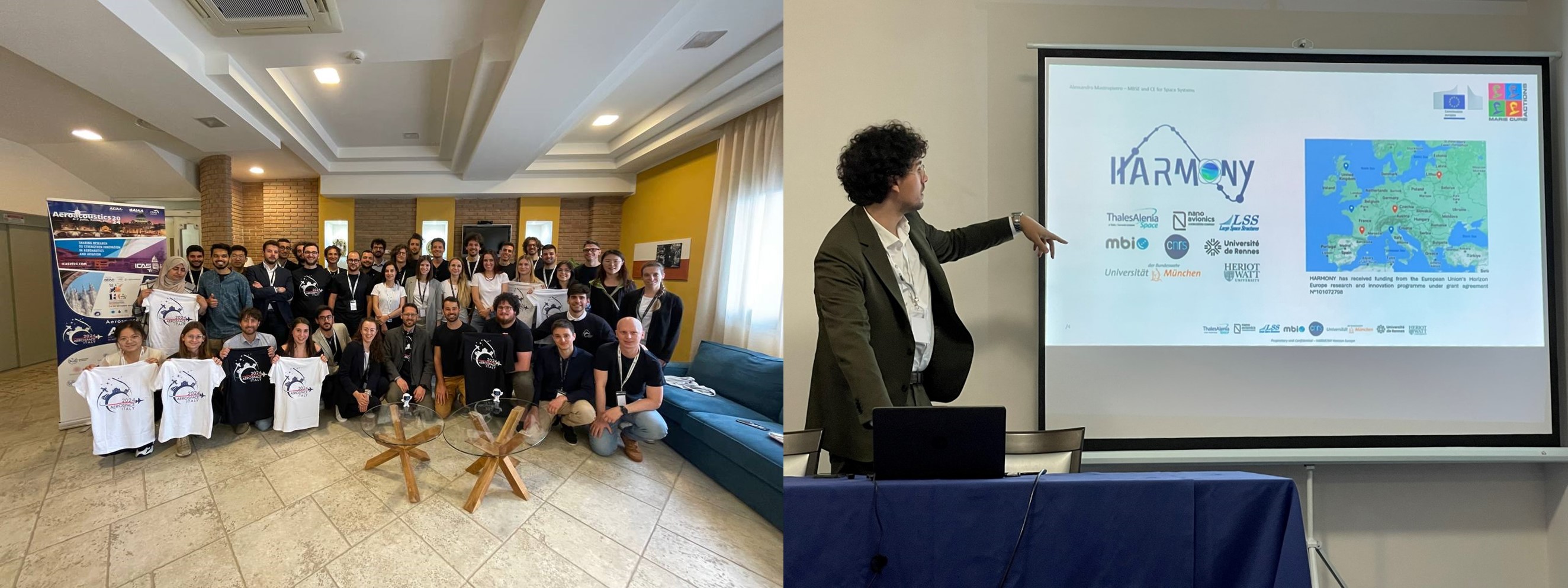
In May 2024, HARMONIST Alessandro Mastropietro had the opportunity to present his research at the AIDAA International Aerospace PhD Days 2024, a part of AerospaceItaly2024. Alessandro shared his extended abstract titled "Model-Based Systems Engineering and Concurrent Engineering for Satellite Systems," providing an overview of his work within the HARMONY Project - Horizon Europe.
The event brought together over 40 PhD students from more than 10 universities worldwide, creating a dynamic and stimulating environment to discuss the latest advancements in aerospace engineering. Alessandro’s presentation highlighted the importance of integrating Model-Based Systems Engineering (MBSE) and Concurrent Engineering (CE) to improve satellite system design and enhance the efficiency of space missions.
It was also a great occasion for networking and learning about the current state of research in the aerospace field. Seminars were held on MSCA post-doctoral opportunities, while Telespazio’s CTO presented insights into the company and future career perspectives for aerospace professionals.
Alessandro’s participation in this event reinforced the significance of his research in the context of the New Space Economy and further solidified his role in the international aerospace research community.
#AIDAA2024 #MSCA #MBSE #AerospaceResearch #HARMONYProject #SatelliteSystems #PhDDays #ConcurrentEngineering
Event Website
Link to the Paper

HARMONY extends its gratitude to Thales UK for hosting the PhD day 2024 in Glasgow.
Representing Thales Alenia Space, the Harmonist Aymeric Cailleux had the opportunity to introduce his PhD topic to fellow Thales PhD students, academics, and collaborators.
Aymeric provided the audience with an understanding of how digital twins can enhance active phased array technology in satellite communication. These digital replicas offer numerous benefits, including accelerating the development process for antenna and microwave designers, and enabling the anticipation and mitigation of interferences, consequently elevating overall efficiency.
These two days were rich with insightful presentations, fostering the expansion of knowledge and sparking discussions on potential future collaborations.

The EuCAP'24 convened session "Satellite Antennas for 6G Satcom", co-organized by the Horizon Europe projects HARMONY and ANTERRA, has been a great occasion to discuss the latest research & development activities in the domain of active antennas. More than 60 participants attended the presentations on topics ranging from advanced resource allocation solutions to the design of low-profile Ka-Band antennas.
The session has been chaired by Dr. Thomas Delamotte (First from left), research group leader at the University of the Bundeswehr Munich and coordinator of HARMONY, and Dr. Ulf Johannsen (Second from left), associate professor at the Eindhoven University of Technology and coordinator of ANTERRA. Dr. Hervé Legay (Second from right), head of antennas RF systems R & T at Thales Alenia Space France, and Prof. George Goussetis (First from right), head of the Institute of Sensors Signals and Systems at Heriot-Watt University, have also provided a valuable support in the preparation of this session.

Various satellite operators like Starlink have recently initiated tests of the so called direct-to-cell connectivity. This new service enables communication to and from satellites with common mobile phones. Even though the first commercial deployments of direct-to-cell connectivity will be a step towards the anytime, anyplace mobile communication, the achievable data rates are in no way comparable to those of our terrestrial cellular networks. Future satellite systems urgently need groundbreaking approaches to reduce this gap. Coordinated networks of distributed satellites are at the heart of the HARMONY project and represent a promising solution in this context.
The views on this hot topic from HARMONY supervisors Prof. Andreas Knopp and Dr. Thomas Delamotte as well as their institute colleague Diego Tuzi have been gathered by IEEE Spectrum journalist Lucas Laursen in his article “Satellites are becoming the New Cellphone Towers”. Laursen’s story presents key facts about recent developments in the field and discusses upcoming research challenges. Read the full story on IEEE Spectrum!
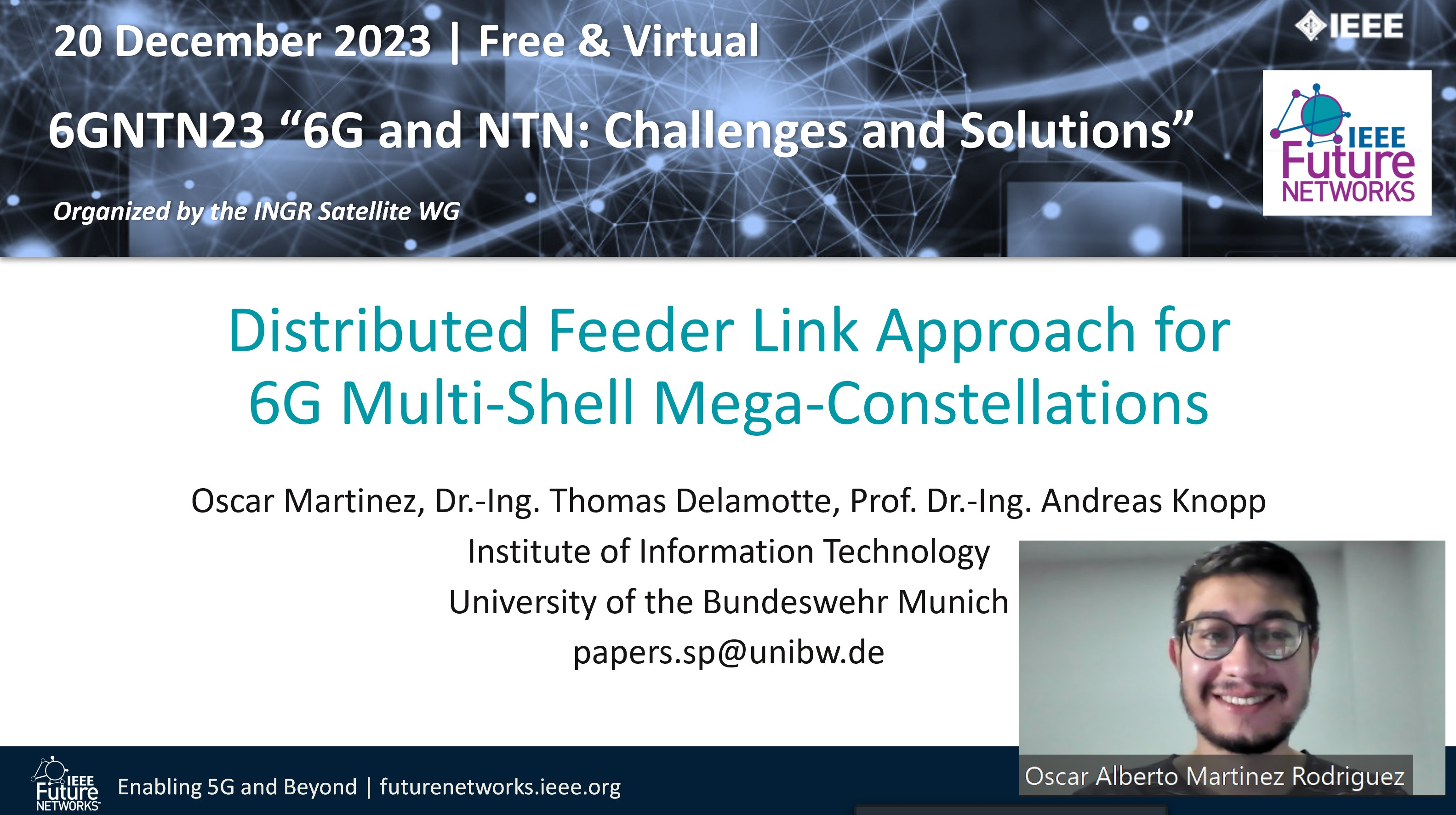
In a notable achievement, Oscar Martinez, a HARMONY PhD candidate from the Bundeswehr University Munich, secured the 3rd place in the IEEE Future Networks contest, which sought for innovating ideas in NTN and 6G technology.
The collaborative efforts of Oscar Martinez, Dr. Thomas Delamotte and Prof. Andreas Knopp, which is focused on distributed feeder links for NGSO Mega-constellations, aims to overcome the current feeder link bottleneck while also enhancing system scalability. This work received attention and was detailed in a webinar held on December 20th, 2023.
The winning presentations and ranking announcements are available on-line on the following link:
https://drive.google.com/file/d/1oAMJM4Pq9u-nKlTolr_qTst60glLs2gy/view?usp=drive_link
Many thanks to the contest organizers from the IEEE Future Networks Community for providing this opportunity to share our work with a broader audience. This award represents a recognition of the dedication and creativity of the team and underlines the Harmony project’s commitment to shaping the future of connectivity.
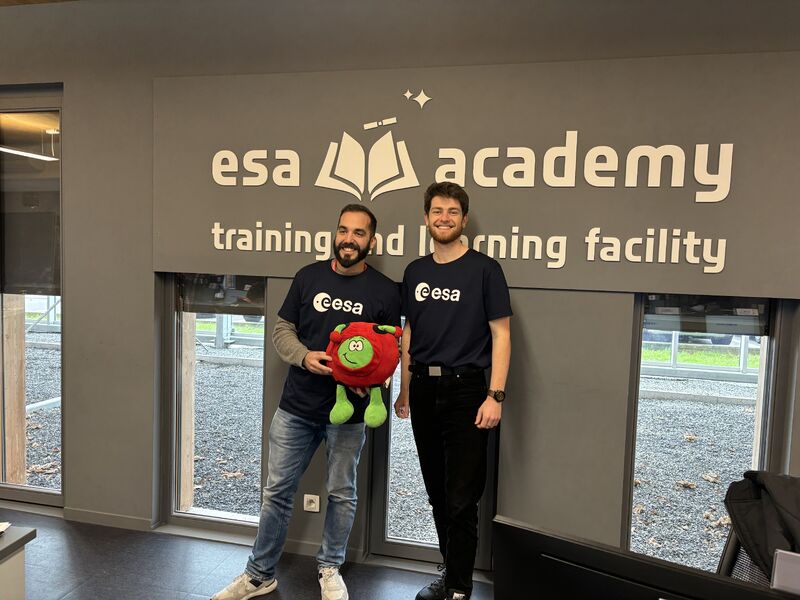
At the end of November 2023, our Harmonists Giulio Orlando and Aymeric Cailleux have had the immense privilege of joining 30 brilliant engineering and physics Ph.D. and Master's students from all around the ESA Member States for four jam-packed days of training on Satellite Communication Systems at European Space Agency - ESA Academy's Training and Learning Facility in ESEC Galaxia, Belgium. The course focused on providing a foundational understanding of satellite communication, spanning from the inception of TV transmission to contemporary Mega-constellations. Future trends were also discussed and discussions with ESA experts allowed Giulio and Aymeric to explore advanced technologies relevant to their Ph.D. research. Beyond knowledge acquisition, a memorable cultural exchanges among participants from 13 European countries took place.
Giulio and Aymeric feel fortunate and proud to have successfully completed this course, equipped with a certificate of participation and a course transcript. They are now excited to apply the knowledge gained to their work in the HARMONY project.

Oscar Martinez attended the 40th International Communications Satellite Systems conference’s colloquium and the SatNEx V School organized by the University of Bradford. During four days, he took part in enriching lectures and keynote talks from international space institutions and companies.
The colloquium presented valuable actor’s insights for the future applications of satellite telecommunications, including direct-to-cell connectivity and multi-layer constellations. Additionally, all players emphasized the necessity of integrating satellite communications with terrestrial networks, highlighting the upcoming 6G standardization challenges.
On a separate note, the SatNEx V doctorate school focused on the future crucial role of Artificial Intelligence (AI) in satellite services. Among the AI applications presented, the efforts to enhance satellite on-orbit autonomy were highlighted. These works include future self-organizing networks, impairment predictions, and smarter resource allocation—ideas powered by future AI-optimized neuromorphic processors. Certainly, these insights will help shape our future work in the rapidly-evolving context of 6G technology.

Alessandro Mastropietro has attended the Concurrent Engineering Workshop 2023 organized by the European Space Agency - ESA. The objective of the training session was to perform the preliminary design of the space and ground segments of a mission using concurrent engineering and the COncurrent Model-based dEsign Tool (COMET) in just 5 days. 40 students were divided into different teams supervised by ESA engineers and led along the design, taking advantage of the use of the ESA Academy’s Concurrent Design Facility (#CDF).
The successful result of the training has shown how a centralized system data model together with a model-based and concurrent approach can significantly optimize design performance and support decision-making and risk management. This experience was extremely meaningful for Alessandro’s Research, allowing him to learn a lot from ESA system engineers and create connections with students from all over Europe.

Prof. Dr.-Ing. Andreas Knopp, director of the institute of information technology at the Bundeswehr University and HARMONY supervisor, has held a keynote speech “Distribution: a key enabler for future satellite systems” during the IEEE PIMRC Conference 2023, a flagship conference from the IEEE Communications Society. The presentation took place during a dedicated workshop on “Mega Constellation Satellite Networks for 6G” in front of an audience of international academic and industrial experts.
Prof. Knopp emphasized in his talk the growing importance of satellites to meet the requirements of IMT-2030 (International Mobile Telecommunications), a framework that sets the objectives of 6G development. While around 4% of the Earth surface can be covered with terrestrial infrastructures, a so-called “Ubiquitous Connectivity” will only be possible with the integration of non-terrestrial networks. In this context, coordinated formations of small satellites, known as satellite swarms, appear as a key enabler to provide broadband connectivity to our everyday life smartphones. The efficient exploitation of frequency resources with beamforming solutions and the synchronization of swarm nodes represent some of the research challenges discussed by Prof. Knopp during his intervention.
The game-changing potential of coordinated distributed ground stations for high-speed data transfer between the ground network and the space segment was another key topic addressed in Prof. Knopp’s tutorial. The ever-growing demand for data rates in communication networks indeed confronts system designers with a risk of traffic congestion in the feeder link. In that respect, synchronized ground stations combined with the application of advanced multi-antenna signal processing schemes pave the way to highly efficient feeder link architectures.
Research challenges on the topic of distributed solutions for satellite systems are at the core of the HARMONY project. The keynote speech of Prof. Knopp has been an excellent opportunity to make the research community aware of HARMONY activities.

The HARMONY PhD students and their supervisors have met at Thales Alenia Space France in Toulouse from May 30th to June 2nd, 2023. For the sake of cross-fertilization, part of the event was jointly organized with the ANTERRA project, another Marie-Curie industrial doctoral network with a focus on antenna front-end for satellite systems.
This first network-wide workshop has been the occasion for the „Harmonists“ to follow inspiring talks from Thales experts and external speakers. The flexibilization of satellite platforms with active antennas and advanced digital processors, mega constellations design, navigation and RF sensing services via satellite belong to the list of highly relevant topics discussed during the presentations and the fruitful exchanges between participants. A member of the HARMONY advisory board, Nader Alagha (ESA ESTEC), also gave the attendants insights into the research activities of the ESA SatNEx V project.
To foster the cross-disciplinary skills of the Harmonists and prepare them for the complex engineering challenges they will have to address in their career, concurrent engineering activities have been organized on the last day of the event. This group activities have allowed the students to initiate detailed discussions on the definition of future satellite missions and to identify cross-cutting aspects between their research topics. These group activities will be continuously encouraged during the HARMONY project to exploit synergies between the PhD works.

The European Conference on Antennas and Propagation 2023, held in Florence, Italy, from 26th to 31st March 2023, has been the occasion for international experts to discuss innovative antenna solutions for broadband satellite systems. A dedicated session, organized by the HARMONY partners CNRS and Heriot-Watt University, indeed involved talks and exchanges on this topic with engineers and researchers from Thales Alenia Space, ViaSat, NASA/JPL, UCSD and WaveUp.
The requirements for supporting a high number of spot beams call for new architectures of passive and active antennas as well as methodologies in their processing. Meanwhile, whilst satellite services have until recently predominantly relied in large geostationary platforms, the emergence of LEO and MEO constellations provide alternative and/or complementary infrastructure for future rollouts. The requirements and constraints posed to the antenna systems are distinct across GEO, MEO and LEO satellites, thereby creating a vibrant research topic for the antenna community in general and the HARMONY researchers in particular.

The Marie Sklodowska-Curie Actions project HARMONY, funded under Horizon Europe, has been officially kicked-off on October 25th, 2022 at Thales Alenia Space France in Toulouse. Nine highly talented PhD students will be recruited within the HARMONY consortium to conduct research on promising technologies for future multilayered satellite systems. HARMONY aims to foster cross-disciplinary collaboration between the researchers. As a consequence, the project has been structured around three core competencies - system engineering, signal processing and antenna hardware design - to gain deep insight into the design of these complex systems
The kick-off meeting has been the occasion for all partners to present their institution and thoroughly discuss the scientific objectives of the project. Ulf Johannsen, coordinator of the ANTERRA project, another Marie Curie Action focusing on satellite systems, also got the opportunity to present his project and explore potential synergies with HARMONY.









